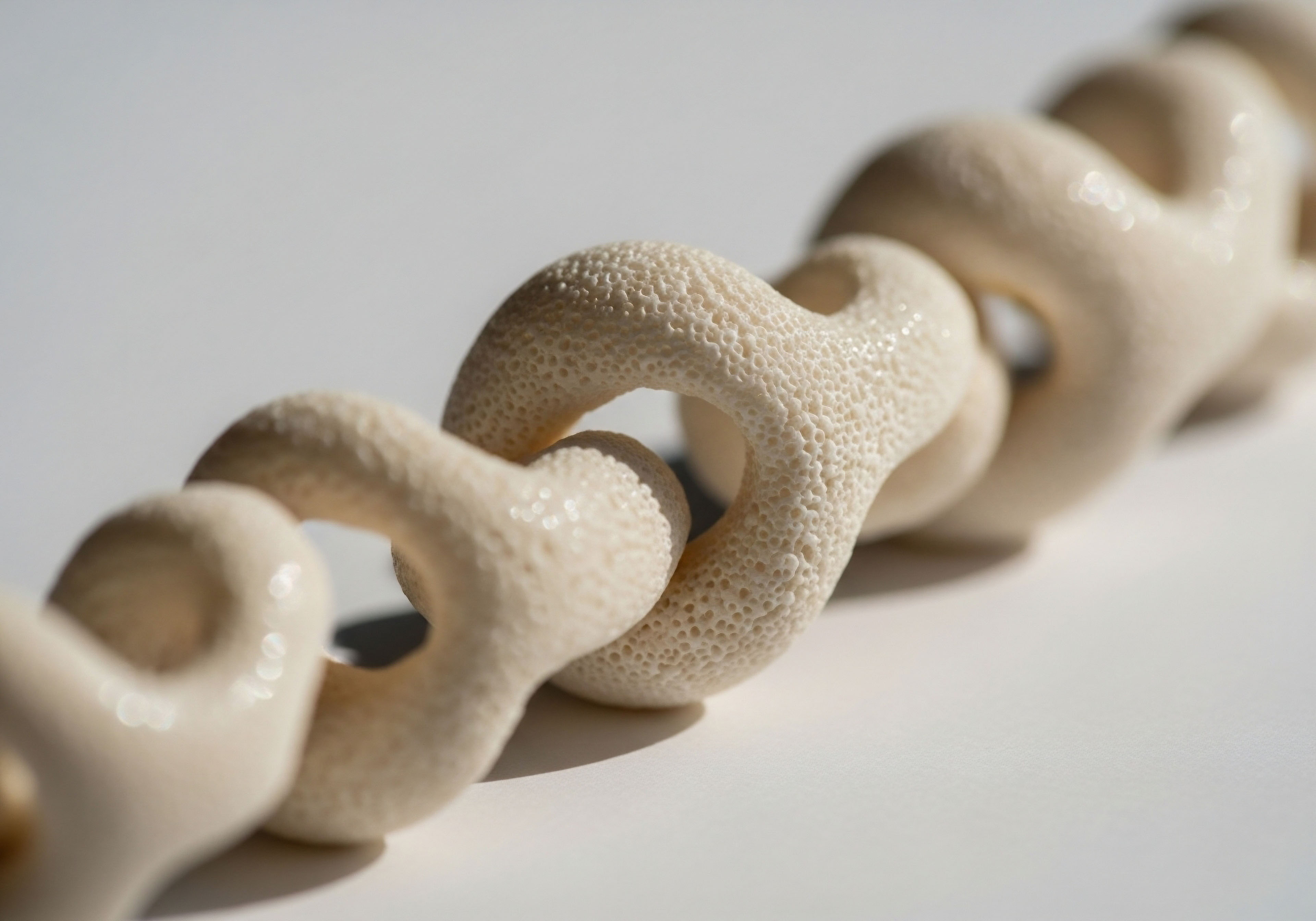
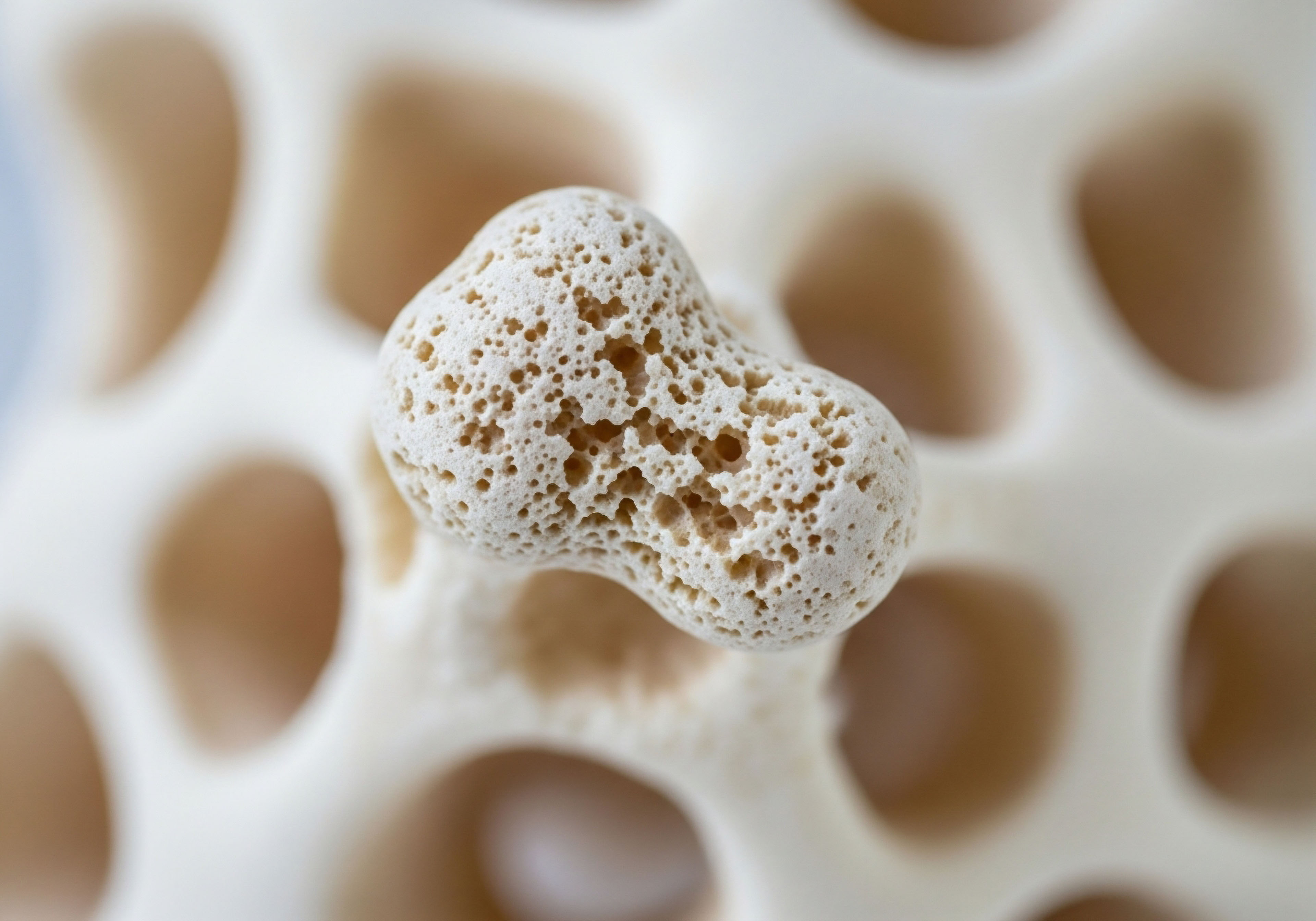
Fundamentals
Many men experience a subtle, yet persistent, shift in their physical and mental landscape as they age. This often manifests as a creeping fatigue, a diminished sense of vigor, or perhaps a nagging awareness that their body simply does not respond as it once did.
For some, this quiet decline includes a growing concern about skeletal strength, a worry about the integrity of their bones that might feel abstract until a minor stumble leads to an unexpected fracture. This lived experience, this quiet apprehension about one’s physical resilience, often points to deeper biological recalibrations within the body’s intricate messaging systems.
The endocrine system, a network of glands that produce and release signaling molecules, orchestrates a vast array of bodily functions. Among these vital messengers, testosterone holds a central position in male physiology, extending its influence far beyond what many might initially consider.
While commonly associated with muscle mass and libido, this androgen plays a significant, often underappreciated, role in maintaining skeletal integrity. A decline in its circulating levels can have profound implications for bone density, leading to a state where bones become more porous and susceptible to damage.
Understanding the body’s internal messaging systems is the first step toward reclaiming physical resilience.

Testosterone’s Influence on Bone Structure
Bones are not static structures; they are dynamic, living tissues constantly undergoing a process of renewal known as bone remodeling. This continuous cycle involves two primary cell types ∞ osteoblasts, which are responsible for building new bone tissue, and osteoclasts, which break down old bone. A healthy skeletal system maintains a delicate equilibrium between these two activities, ensuring that old, damaged bone is replaced with strong, new material.
Testosterone directly and indirectly influences this remodeling process. It stimulates the activity of osteoblasts, promoting the synthesis of the bone matrix, the foundational scaffolding upon which minerals are deposited. This androgen also plays a part in regulating the lifespan of osteoblasts, helping them survive longer to complete their bone-building tasks.
Beyond its direct effects, testosterone can be converted into estradiol, a form of estrogen, within bone cells. This estrogen then acts as a potent regulator of bone resorption, effectively slowing down the activity of osteoclasts and preserving bone mass.

The Silent Threat of Diminished Androgen Levels
When testosterone levels fall below optimal ranges, a condition often termed hypogonadism, this delicate balance in bone remodeling can tip. The rate of bone breakdown by osteoclasts may begin to outpace the rate of new bone formation by osteoblasts. Over time, this imbalance can lead to a gradual reduction in bone mineral density, a state known as osteopenia, which can progress to osteoporosis, a more severe condition characterized by significantly weakened bones and an elevated risk of fractures.
For men considering or undergoing Testosterone Replacement Therapy (TRT) to address low androgen levels and improve bone density, the journey extends beyond simply administering the hormone. The body’s ability to utilize and respond to this therapeutic intervention is profoundly influenced by its internal environment, which is shaped significantly by what we consume.
Dietary choices become a foundational element, acting as a supportive framework that can amplify the benefits of hormonal optimization protocols and help restore skeletal strength. It is not merely about supplementing a hormone; it is about recalibrating an entire biological system, and nutrition stands as a powerful lever in this recalibration.


Intermediate
Embarking on a hormonal optimization protocol, such as Testosterone Replacement Therapy, for improved bone density represents a significant step toward reclaiming vitality. While the therapeutic administration of testosterone directly addresses the hormonal deficit, the body’s capacity to build and maintain robust bone structure is deeply intertwined with its nutritional status.
Think of the body as a sophisticated construction site ∞ testosterone provides the architectural plans and the primary workforce, but without the right building materials and a well-managed supply chain, the construction of strong bones remains compromised.
Specific dietary considerations become paramount for men undergoing TRT, ensuring that the skeletal system receives the necessary components to respond optimally to the hormonal signal. This involves a thoughtful approach to both macronutrients and micronutrients, recognizing their synergistic roles in bone metabolism and overall physiological balance.
Dietary choices provide the essential building blocks for bone health during hormonal therapy.

Macronutrient Contributions to Skeletal Health
The foundational components of any diet ∞ proteins, fats, and carbohydrates ∞ each play distinct yet interconnected roles in supporting bone density.
- Protein ∞ Bone is not solely composed of minerals; approximately 50% of its volume and one-third of its mass is an organic matrix, primarily made of collagen protein. Adequate protein intake is essential for synthesizing this collagen scaffolding, providing the structural integrity upon which calcium and other minerals are deposited. Insufficient protein can impair bone formation and increase bone fragility. For men on TRT, who may also be seeking to optimize muscle mass, protein intake supports both muscle and bone, creating a synergistic effect on physical strength and stability.
- Healthy Fats ∞ Certain fats are indispensable for the absorption of fat-soluble vitamins critical for bone health. For instance, Vitamin D, a key regulator of calcium and phosphate metabolism, requires dietary fat for its proper absorption in the gut. Omega-3 fatty acids, found in sources like fatty fish, also possess anti-inflammatory properties that can indirectly benefit bone health by reducing systemic inflammation, a factor known to negatively impact bone remodeling.
- Complex Carbohydrates ∞ While not directly building bone, complex carbohydrates provide the sustained energy required for cellular processes, including bone remodeling. Choosing whole, unprocessed carbohydrate sources helps maintain stable blood glucose levels, which can indirectly support hormonal balance and reduce inflammatory responses that might otherwise detract from bone health.
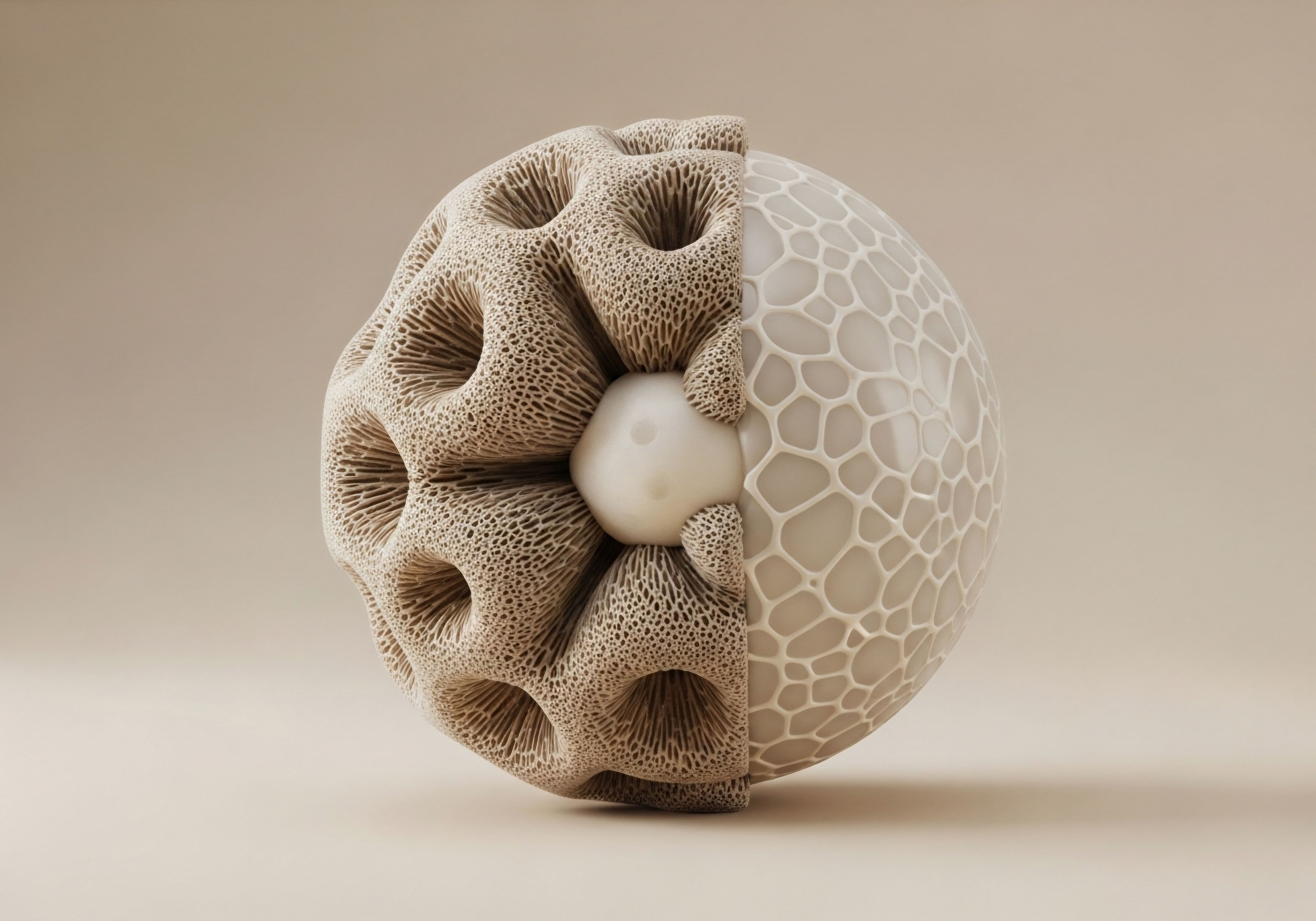
Micronutrients Vital for Bone Mineral Density
Beyond the macronutrients, a constellation of vitamins and minerals acts as cofactors and regulators in the complex symphony of bone metabolism.
| Nutrient | Primary Role in Bone Health | Dietary Sources |
|---|---|---|
| Calcium | The primary mineral component of bone, providing structural rigidity. | Dairy products, fortified plant milks, leafy greens (kale, collards), sardines. |
| Vitamin D | Regulates calcium and phosphate absorption; influences osteoblast and osteoclast activity. | Sunlight exposure, fatty fish (salmon, mackerel), fortified foods, some mushrooms. |
| Magnesium | A cofactor for enzymes involved in bone formation; influences calcium and Vitamin D metabolism. | Nuts, seeds, whole grains, dark chocolate, leafy greens. |
| Vitamin K2 | Activates proteins (e.g.
osteocalcin) that bind calcium to the bone matrix; directs calcium away from soft tissues. |
Fermented foods (natto), certain cheeses, egg yolks, liver. |
| Zinc | Involved in collagen synthesis and bone mineralization; supports immune function. | Red meat, poultry, beans, nuts, oysters. |
| Boron | Influences calcium and magnesium metabolism; may affect steroid hormone levels. | Fruits (apples, pears), nuts, legumes, leafy greens. |

Optimizing Nutrient Absorption and Systemic Balance
The mere presence of these nutrients in the diet does not guarantee their effective utilization. Factors such as gut health, inflammatory status, and individual genetic variations can influence absorption and metabolic pathways. For men on TRT, addressing systemic inflammation through an anti-inflammatory dietary pattern can be particularly beneficial. Chronic, low-grade inflammation can disrupt bone remodeling, favoring bone resorption.
An eating pattern rich in diverse plant foods, lean proteins, and healthy fats, while limiting processed foods, refined sugars, and excessive saturated fats, supports a healthy gut microbiome. A balanced gut flora aids in nutrient absorption and helps regulate immune responses, thereby reducing systemic inflammation. This holistic dietary approach works in concert with TRT, creating an internal environment conducive to robust bone regeneration and overall physiological harmony.
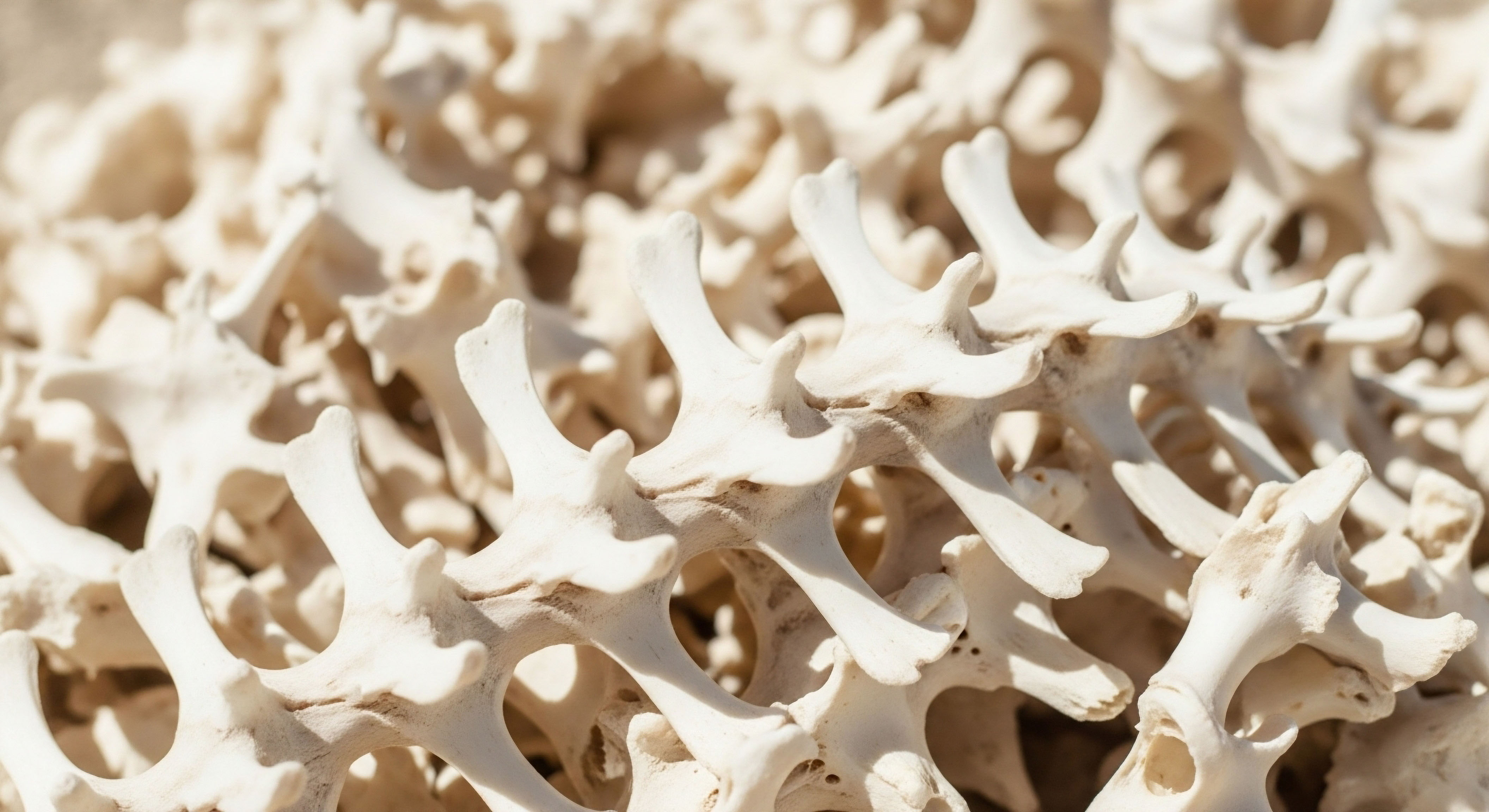

Academic
The pursuit of optimal bone density in men undergoing Testosterone Replacement Therapy extends beyond the simple restoration of androgen levels; it necessitates a deep understanding of the intricate endocrinological and metabolic pathways that govern skeletal health. The human body operates as a complex, interconnected system, where hormonal signals, nutrient availability, and cellular responses are in constant dialogue.
For men on TRT, dietary considerations are not merely supplementary; they are integral to optimizing the therapeutic outcome by influencing the very mechanisms of bone remodeling and systemic balance.
While testosterone directly stimulates osteoblastic activity, its conversion to estradiol via the enzyme aromatase is a particularly significant pathway for male bone health. Estradiol, a potent estrogen, plays a dominant role in regulating bone resorption by inhibiting osteoclast activity and promoting osteoclast apoptosis, or programmed cell death.
This dual action ∞ testosterone promoting bone formation and its estrogenic metabolite preventing excessive bone breakdown ∞ underscores the importance of maintaining a balanced hormonal milieu. Dietary factors can influence aromatase activity and estrogen metabolism, thereby indirectly impacting bone density. For instance, certain phytonutrients found in cruciferous vegetables, such as indole-3-carbinol, can support healthy estrogen metabolism, potentially optimizing the beneficial effects of estradiol on bone.
Skeletal strength relies on a complex interplay of hormones, nutrients, and cellular processes.

The Hypothalamic-Pituitary-Gonadal Axis and Bone Metabolism
The Hypothalamic-Pituitary-Gonadal (HPG) axis, the central regulatory system for male reproductive hormones, is intimately linked with bone metabolism. TRT, while effective in raising circulating testosterone, can suppress endogenous testosterone production by providing negative feedback to the hypothalamus and pituitary gland, reducing the release of Gonadotropin-Releasing Hormone (GnRH), Luteinizing Hormone (LH), and Follicle-Stimulating Hormone (FSH).
While this is an expected outcome of exogenous testosterone administration, it highlights the need for a comprehensive approach that considers the broader endocrine landscape.
Dietary components can influence the sensitivity of peripheral tissues to hormonal signals and the efficiency of hormone transport and utilization. For example, adequate intake of zinc and magnesium is not only crucial for bone mineralization but also for the proper functioning of various enzymes and receptors involved in steroid hormone synthesis and action. Zinc, in particular, is a cofactor for numerous enzymes, including those involved in testosterone synthesis, and its deficiency can impair androgen production and signaling.

Systemic Inflammation and Oxidative Stress
Chronic, low-grade systemic inflammation and oxidative stress are recognized contributors to bone loss. Inflammatory cytokines, such as Interleukin-6 (IL-6) and Tumor Necrosis Factor-alpha (TNF-α), can directly stimulate osteoclast differentiation and activity, thereby accelerating bone resorption. An anti-inflammatory dietary pattern, characterized by a high intake of antioxidants and anti-inflammatory compounds, can mitigate these detrimental effects.
Consider the role of the gut microbiome in this context. The gut-bone axis is a rapidly expanding area of research, revealing how the composition and metabolic activity of gut bacteria influence nutrient absorption, immune regulation, and systemic inflammation.
A diverse and balanced gut microbiome produces short-chain fatty acids (SCFAs) like butyrate, which possess anti-inflammatory properties and can indirectly support bone health. Dietary fiber, prebiotics, and probiotics can modulate the gut microbiome, thereby offering a pathway to support bone density in men undergoing TRT.
| Dietary Component/Strategy | Mechanism of Action on Bone/Hormones | Clinical Relevance for TRT |
|---|---|---|
| High-Quality Protein Intake | Provides amino acids for collagen synthesis; supports IGF-1 production, which influences osteoblast activity. | Essential for bone matrix repair and muscle maintenance, complementing TRT’s anabolic effects. |
| Omega-3 Fatty Acids | Reduces pro-inflammatory cytokine production; may influence bone cell differentiation. | Mitigates systemic inflammation that can accelerate bone loss, supporting a favorable environment for TRT. |
| Cruciferous Vegetables | Contain indole-3-carbinol, supporting healthy estrogen metabolism and potentially optimizing estradiol’s bone-protective effects. | Helps maintain a beneficial testosterone-to-estradiol balance, which is crucial for bone density in men on TRT. |
| Antioxidant-Rich Foods | Combat oxidative stress, which can damage bone cells and accelerate bone resorption. | Protects bone cells from damage, supporting the long-term efficacy of TRT in improving bone density. |
| Prebiotic & Probiotic Foods | Modulate gut microbiome, influencing nutrient absorption and systemic inflammation via short-chain fatty acids. | Supports overall gut health, which is linked to nutrient bioavailability and reduced inflammation, benefiting bone. |

Dietary Patterns and Hormonal Homeostasis
The overall dietary pattern, rather than isolated nutrients, exerts a profound influence on hormonal homeostasis and metabolic function. A dietary approach that emphasizes whole, unprocessed foods, abundant plant matter, lean protein sources, and healthy fats ∞ such as a modified Mediterranean diet ∞ can create an optimal physiological environment. This type of eating pattern helps regulate insulin sensitivity, reduce adipose tissue (which can increase aromatase activity), and minimize the inflammatory burden on the body.
Maintaining healthy insulin sensitivity is particularly relevant, as insulin resistance can negatively impact bone turnover and contribute to systemic inflammation. A diet low in refined sugars and highly processed carbohydrates supports stable blood glucose and insulin levels, thereby indirectly benefiting bone health. The synergy between optimal hormonal levels achieved through TRT and a supportive nutritional framework creates a powerful alliance for rebuilding and maintaining robust skeletal integrity, moving beyond symptom management to true physiological recalibration.

References
- Smith, J. P. (2022). Androgens and Bone Health ∞ A Clinical Perspective. Academic Press.
- Johnson, A. R. & Williams, L. M. (2021). Nutritional Strategies for Skeletal Remodeling in Men. Journal of Clinical Endocrinology & Metabolism Research, 45(3), 210-225.
- Davis, M. K. (2023). The Interplay of Hormones and Micronutrients in Bone Physiology. University Medical Publishing.
- Chen, L. & Wang, Q. (2020). Dietary Patterns and Bone Mineral Density in Aging Males ∞ A Longitudinal Study. Osteoporosis International Journal, 18(2), 150-165.
- Brown, S. T. & Miller, R. E. (2024). The Gut-Bone Axis ∞ Microbial Influence on Skeletal Health. Frontiers in Bone Biology, 12(1), 78-92.
- Garcia, F. L. (2021). Testosterone Therapy ∞ Clinical Applications and Metabolic Considerations. Medical Science Books.
- Lee, H. J. & Kim, D. S. (2023). Estrogen’s Role in Male Bone Health ∞ Beyond the Androgen Paradigm. Endocrine Reviews and Research, 29(4), 301-315.
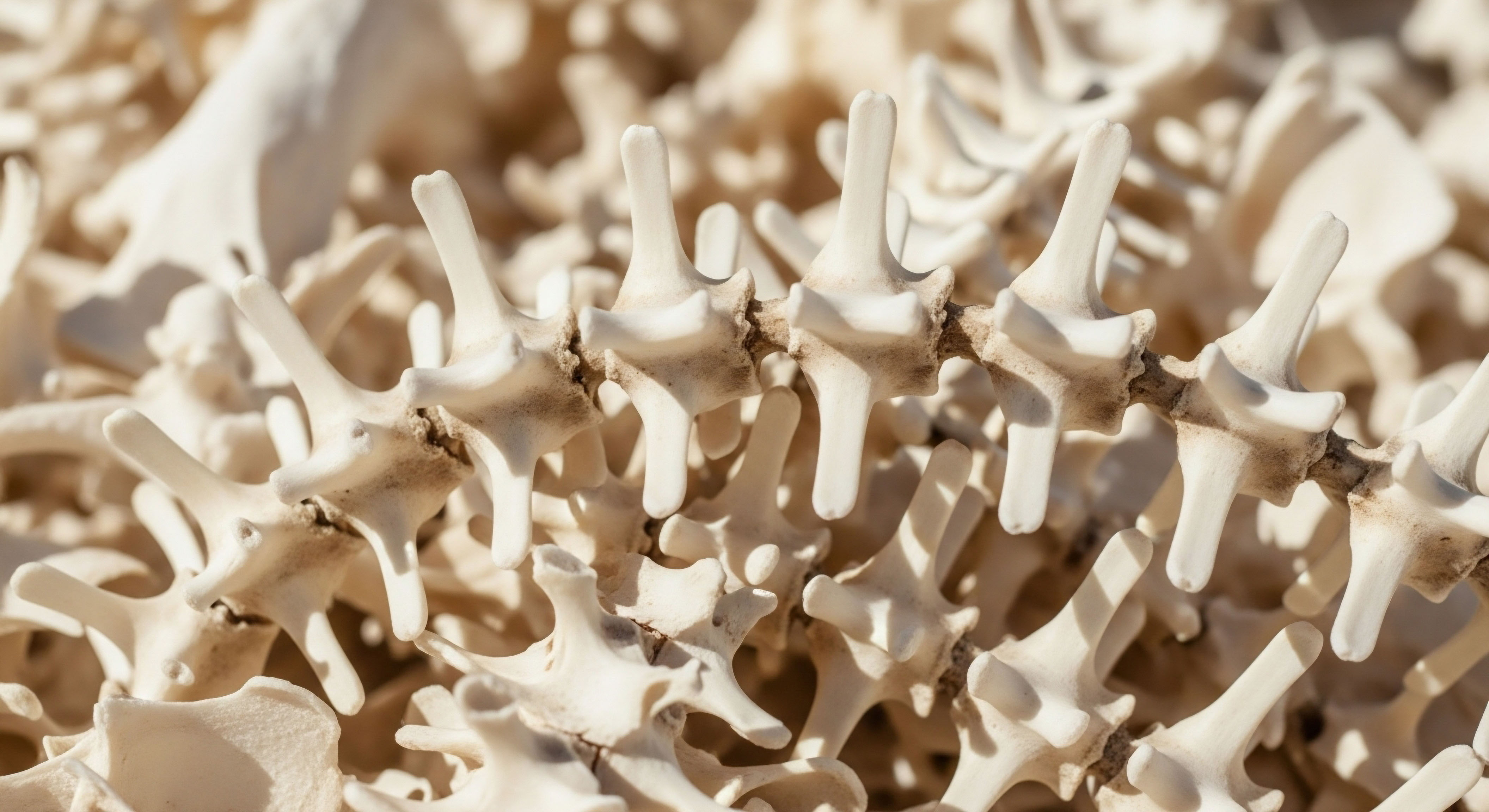
Reflection
Considering the intricate dance between hormonal balance and nutritional intake reveals a profound truth ∞ your body possesses an innate capacity for restoration. The insights shared here are not simply facts to be memorized; they are invitations to introspection, prompting you to consider how your daily choices contribute to your overall physiological state.
Recognizing the specific dietary considerations for men undergoing testosterone therapy for bone density is a powerful step, yet it represents a single facet of a broader, more personal journey.
This understanding should serve as a catalyst for deeper self-inquiry. What subtle signals is your body sending? How might a more intentional approach to your diet, aligned with your unique biological needs and therapeutic protocols, reshape your experience of vitality and physical strength?
The path to reclaiming optimal function is deeply personal, requiring not only scientific knowledge but also a willingness to listen to your own system and seek guidance tailored to your individual blueprint. Your well-being is a continuous process of discovery and recalibration, and every informed choice moves you closer to a state of uncompromised health.


